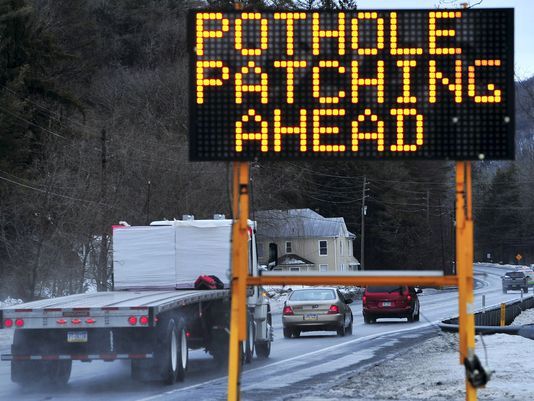
So, it has come to this – our cowardly legislators have reduced themselves to middlemen, bumbling brokers who drop big decisions into the laps of the voters.
As we saw last week with a road package slated for an uncharacteristic May special election, the 148 members of our state House and Senate no longer craft solutions to problems. They decide the wording of ballot proposals and then punt to the same electorate that chose them to do the job of legislating – more specifically, to provide leadership.
In this case, the pols headed out of town, looking forward to a long holiday vacation, all the while patting themselves on the back as they exited the Capitol.
Meanwhile, motorists will suffer through another long winter season of congested, crumbling roads and teeth-rattling potholes. Voters who thought they reached a 2-year reprieve from maddening TV campaign ads will be bombarded with commercials shouting the pros and cons of a proposal that raises the sales tax to fund road fixes. And those heavily invested in this issue will have the inevitable ability to second-guess the results of this expensive election because a May vote will certainly produce a low turnout.
The swift condemnation of this proposal, a constitutional amendment overwhelmingly approved on a bipartisan basis without providing a backup plan, must have shocked lawmakers. I have rarely seen the editorial pages of The Detroit News and Detroit Free Press employ such blunt criticisms with nearly word-for-word similarities. I wonder if North Korean hackers were up to some computer mischief prior to publication.
After 24 months of debate and impasse, road funding — the No. 1 issue facing this Legislature — was tackled in the middle of the night with a lame-duck House speaker in his final session holding sway over the entire package. Eleventh-hour, chaotic decision-making again prevailed.
Is this any way to do business? Unfortunately, this represents the new normal in Lansing.
The pattern of ducking the big issues and placing them on the ballot – or circumventing ballot initiatives launched by the public — has become standard procedure for our elected officials over the past four years.
In fact, Gov. Snyder boasted the other day that he’s confident the 7 percent sales tax plan for roads will pass in part because he’s now batting six for seven on ballot proposals since taking office in 2011.
Michigan voters most recently experienced this phenomenon just five months ago when they were asked to approve a monumental shift in taxes on business machinery and equipment. Lansing placed Proposal 1 on the August primary ballot and it passed, but you would be hard pressed to find a voter who fully understood the complex ballot language.
The so-called Personal Property Tax served as a contentious issue for decades. When legislators finally agreed earlier this year to replace this archaic form of taxation, the House and Senate still took cover. They decided that their multi-layered solution would not take effect unless the voters approved it at the next available election.
It was almost as if the cowering lawmakers needed a pat on the head from their constituents.
With a Legislature split three ways — between the Democratic Party, the Republican Party and the tea party — the result produced on Friday at 5:30 a.m. by bleary-eyed lawmakers is a convoluted package that may be a tough sell.
The lame duck produced an odd duck.
The House and Senate reached a compromise that increases the sales tax to 7 percent – a 17 percent jump from the current six-cents-per-dollar levy – to pay for road improvements. But they also decided to exempt gasoline from the sales tax.
Where is the logic in relying on the sales to fix the roads but to remove that tax from fuel, which is purchased by the people and companies who rely upon the roads? Sounds like: Don’t tax gas for vehicles; tax bikes and shoes.
To be fair, this legislative hodge-podge also dictates a switch from per-gallon taxes at the pump to a more expensive wholesale gasoline tax and it increases registration fees for vehicles and heavy trucks.
Yet, instead of a straightforward proposal to generate road funds, we have 13 pieces of legislation that conversely deal with funding for schools and cities, a new tax on Internet sales (which could be the powder-keg provision), and an allocation for public transportation and commuter rail.
During the horse-trading that took hold in the wee hours, lawmakers also agreed to tack on some obscure items, including the elimination of county gun boards in favor of having county clerks hand out concealed weapons permits (a very bad idea).
Still, the most disturbing aspect of this package, coming after two decades of neglected infrastructure, is that it takes a big step away from the basic concept that our roads should be financed by user fees and taxes. A sales tax levied on consumer goods bears no connection whatsoever to the condition of our roads and bridges.
For example, a traveling salesman or delivery truck driver who spends hundreds of miles per week behind the wheel but rarely buys anything during those many hours on the road will pay very little of this regressive tax. But they are far more responsible for road wear and tear — and far more dependent on quality transportation infrastructure — than an average middle class worker who lives near his job.
If lawmakers living in the Lansing bubble think that’s fair, they’ve got a lot of explaining to do.
But if they cannot get past the fairness issue, voters will likely steer them down a path back to square one. And that means they would actually have to make a decision. Or, more likely, face more gridlock.



